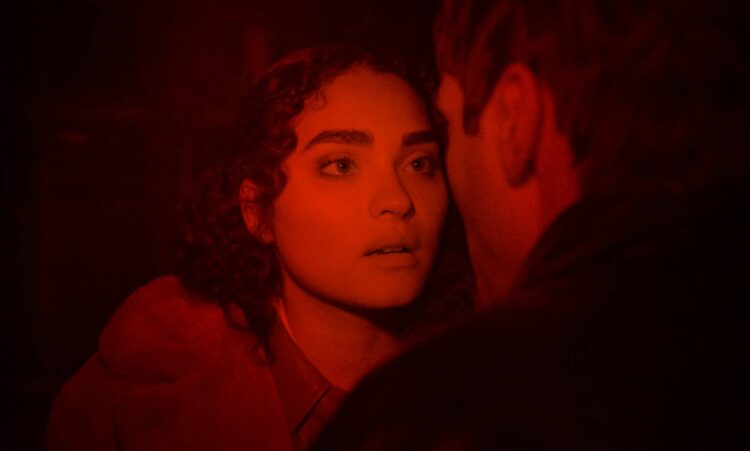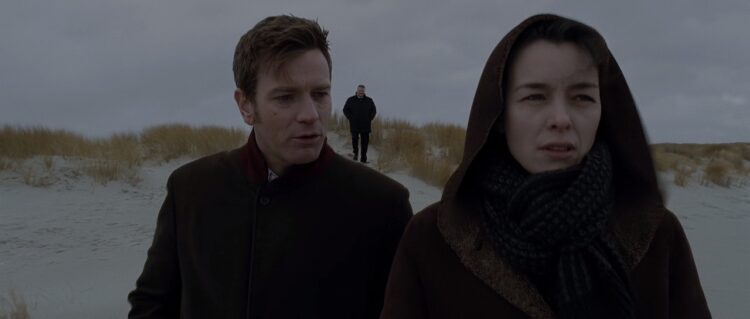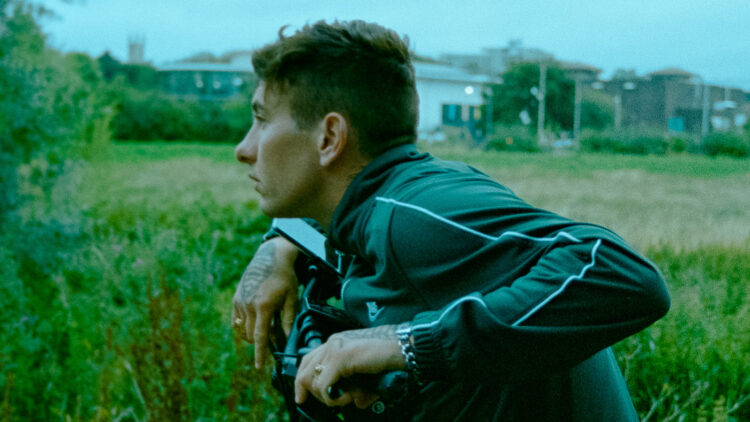

In Andrea Arnold’s Bird, Irish actor Barry Keoghan plays a father of two teenagers. In the film, he had both children when he, too, was a teenager. He’s brash with tattoos everywhere, completely focused on an upcoming wedding with his three-month girlfriend. It’s a stellar performance from him, imbued with his own recent experiences of fatherhood.
Keoghan’s character Bug spends his days on his scooter, moving around Kent. He’s never still, singing to a toad he hopes will pay his bills, dancing in hopes of impressing his soon-to-be wife, going up and down the stairs of the building he and his family squat in, unaware of his children’s daily activities. He’s contradictory, selfish yet loving, hated yet looked up to by his kids. The film, and Bug’s arc, culminates in this wedding, in which Keoghan wears a blue suit and sings to his new wife. Some might say he’s at least trying to be a good father, others will likely say it’s not nearly enough.
Arnold’s first narrative feature in eight years shifts into metaphor without much warning. The film follows Bug’s daughter, 12-year-old Bailey (Nykiya Adams), as she navigates much more mature decisions and relationships. Her responsibilities stack up. Bailey meets Bird (Franz Rogowski), an odd, caring man looking for his parents, any semblance of family. She finds solace in him, or at minimum companionship, a level of closeness not found within her family. Bailey’s relationship with her dad mostly contains raised voices and shared impulsiveness. It’s fraught with an underlying layer of love.
As the Cannes selection arrives in theaters from MUBI, I chatted with Keoghan about his own similarities to Bug, the difficulties of being a young father, and his desire to do a movie musical.
The Film Stage: The film plays on contradictions, especially those felt by Bug towards his kids. He loves them and can’t stand them. Can you tell me more about that aspect of the character?
Barry Keoghan: That’s pure frustration. People who you love, you almost can’t stand them at times because you just get so comfy with one another. You know how to push each other’s buttons. When someone is challenging you or putting you to the test, you know this person inside-out. It’s like, “Why would you do that?” It’s a brother-sister thing, too, or brother-brother. When you spend so much time with someone they get on your nerves. You get on their nerves with small things like chewing with your mouth open.
Did you feel Bug’s relationship with his kids is more like something between siblings?
It’s a very sibling-like relationship, sort of similar to my own child. He’s two but it’s going to be that young-father thing; there’s something to be said about that. I’ve got a friend, and he’s got a son and they’re 17 years apart. He challenges him, and it’s cute and it’s bold and it makes you question your position. I need to step up as a father and be a leader in that way. Because sometimes you can get very comfortable and forget your role.
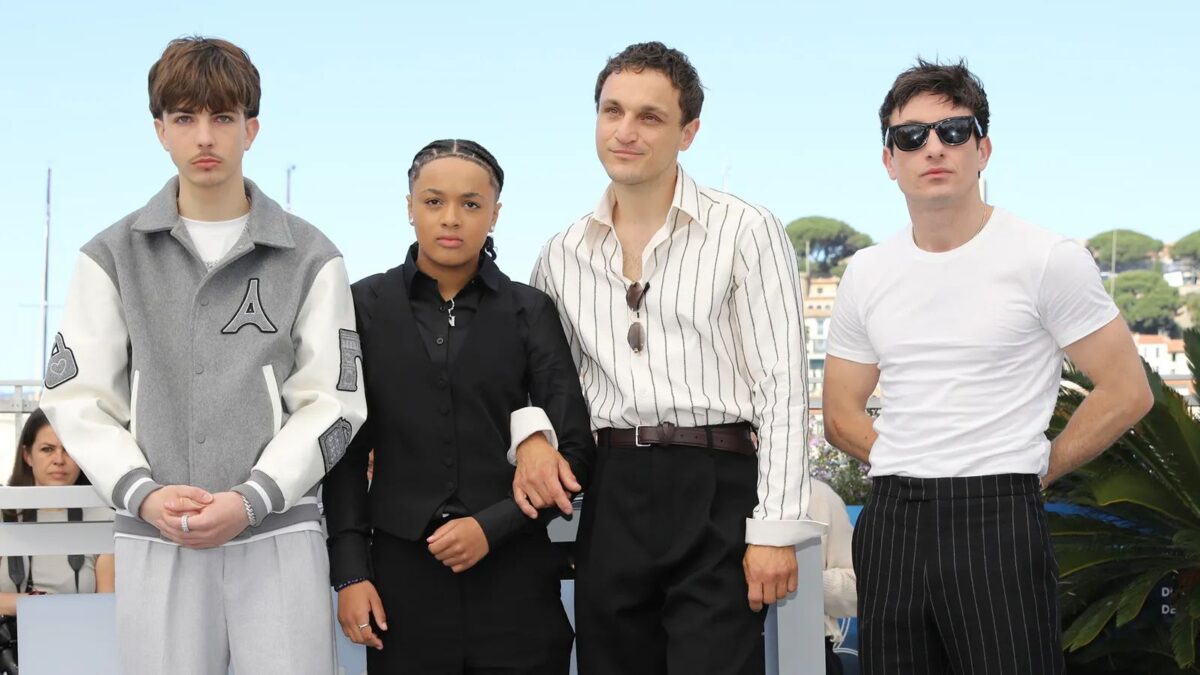
The cast of Bird at the 2024 Cannes Film Festival
Bug is always moving in the film, dancing, on his scooter, etc. Can you tell me more about that idea to keep him always in motion?
He’s always scrambling, always scrambling for answers. How to fix it and then how to make it right. Never thinking about the longevity of things. It’s always time to go. It’s always, “What can make me feel good now? What can I do right now?” Even that selfish line, “This is the most-important day of my life.” Not taking into account that his daughter is going through some stuff at the moment that she’s finding hard to navigate. None of that is taken into consideration. He’s constantly moving. He’s a wheeler-dealer. It’s all innocence.
Do you find relatability there? In those parts of Bug as a character.
Definitely. This part has made me realize I have similar traits to Bug. Men, in general, are quite selfish and very childlike and just not considerate sometimes; it’s just all about us sometimes. This part really made me realize, “Oh, shit––I’m a father.” I need to be my best version for my child to benefit. It’s forced, in a way, but I have to be forced––because for him to have the best guidance or protection or sense of direction, I gotta know where I’m at. And so I took that from Bug, but he just does it in the wrong way. He’s not selfish because he wants to be better; he’s selfish because he wants that wedding to go well.
Can you tell me more about that wedding scene, about dancing and singing in front of the camera?
Dancing and singing isn’t necessarily my thing, to be fucking honest. I’d love to do a musical, by the way. Like La La Land. That was so beautiful. That was so beautiful, incredible. But I think the effort of Bug trying to learn a dance for a wedding is breaking, and trying to sing for a toad is heartbreaking. I think within that effort it’s beautiful to watch someone really sincerely go for it. Don’t get me wrong: when people can sing, it’s so fucking attractive. I can tell you that.
But also when someone can’t sing and they’re trying, it’s like when someone’s crying onscreen… I don’t feel for them as much as someone that’s trying to fight the tears. When someone’s flirting onscreen, I don’t feel the same as when they kiss. With Bug, the singing and the dancing was feeling comfortable with Andrea and a license to be my entire self. I’m not gonna say “silly,” but a place of letting your body take over and just move. She created that.
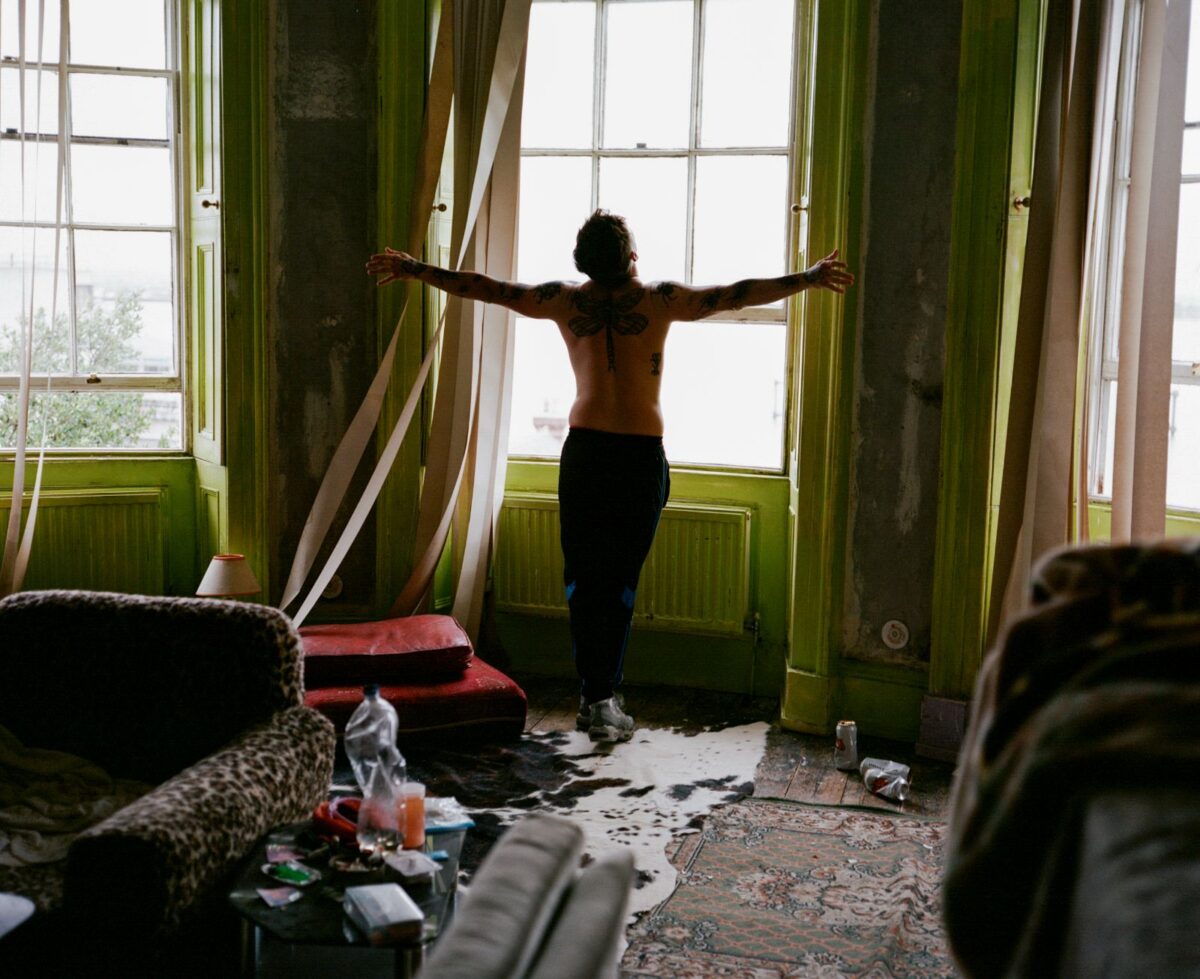
Do you find that part of performing uncomfortable?
I find it not uncomfortable, but I find it another layer of performing. I never signed up to sing or to dance, but if the character is trying to sing or dance or the character needs it, I’ll do it. There’s this idea of having to be perfect, especially in this time and place––you have to be so perfect at everything. It adds so much pressure. I just find it more attractive and more relatable to someone that’s trying that comes across silly, because that’s more real. As soon as someone goes “action” I’m in that place. It’s the rehearsing the steps, or it’s the singing. I’m a very, very shy person. I don’t like audiences; I don’t like the stage. I don’t like to do that. When the cameras are there, I feel like there’s protection.
With a supporting role like this, each moment you have has a level of emotional intensity. It’s often only a couple of minutes per scene, but they’ve got to pack a punch. How do you prepare for these emotional moments in such short spurts, ones that show up sporadically throughout the movie?
I love independent movies for that reason, and movies on this scale. Consistency of that emotional flow lasts longer than on bigger-budget movies when there’s so many more other elements. That flow of things gets broken up again and again. Everyone’s there to do their job. But with this, the camera goes on, the camera goes off, you’re still in that zone. Andrea created a safe space and a community of people that were in this world. We’re not stepping in for action; we’re in the world even after it. You’re just capturing that moment. It’s that moment that exists on- and off-camera for that period of filming. She created that.
Bird is now in NYC theaters and expands this Friday.
The post Barry Keoghan on Young Fatherhood, Loving La La Land, and the Movement of Andrea Arnold’s Bird first appeared on The Film Stage.


